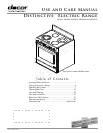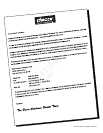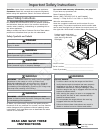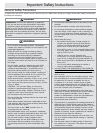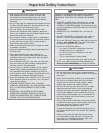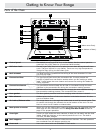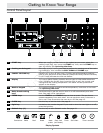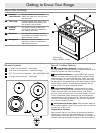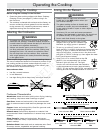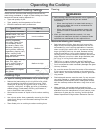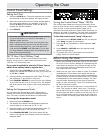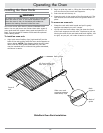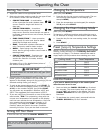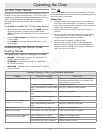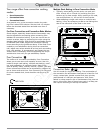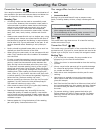
7
Before Using the Cooktop
Before using the cooktop for the first time:
1. Clean the glass cooking surface with Dacor Cooktop
Cleaning Creme (see page 27) before using it for
the first time.
2. The cooktop is cleaned with solvents at the factory to
remove remaining oil and grease from the manufac-
turing process. Any remaining solvent may cause a
slight odor during the first several uses.
Selecting the Cookware
WARNING
• To reduce the risk of burns, ignition of flammable
materials and spillage, cookware handles should be
turned inward so they cannot be easily hit and must
not extend over adjacent element(s).
• Always set utensils gently onto the elements. Do
not drag cookware across the cooktop. Sliding may
damage the finish. Lift utensils to reposition them.
Do not drop them on the cooktop. Also, cookware
with rough bottoms can cause permanent damage
to the glass finish.
Select utensils large enough to cover the heating element.
The use of undersized utensils will expose a portion of the
hot cooking surface to direct contact and may result in
ignition of clothing. Proper centering of the utensil over
the element also improves efficiency.
Use cookware that:
• has flat, smooth bottoms.
• is well balanced.
• has tight fitting lids to keep heat, odors and steam in.
Cookware Characteristics
Aluminium: Heats and cools quickly when frying, braising
and roasting. May leave metal markings on glass.
Cast Iron: Heats and cools quickly. Not recommended
since it retains excessive heat and may damage the cook-
top.
Copper: Heats and cools quickly. Good for gourmet cook-
ing wine sauces and egg dishes.
Enamel ware: Performance depends on material. Not
recommended. Metal imperfections in enamel may scratch
cooktop.
Glass Ceramic: Heats and cools slowly. Not recom-
mended. Heats too slowly. Imperfections in enamel may
scratch cooktop.
Stainless Steel: Heats and cools at moderate rate. Good
for soups, sauces, vegetables and general cooking.
Operating the Cooktop
Turning On An Element
WARNING
• Always check to make sure all control
knobs are in the OFF position when you
are finished cooking.
• The glass cooking surface is durable and
resistant to impact, but not unbreakable.
It can crack or break if a pan or other object is
dropped on it.
• Aluminum foil can melt and cause permanent
damage. Food packaged in aluminum foil should not
be placed directly on the glass cooking surface.
• Never cook food directly on the glass.
• Each element control knob has a small
diagram next to it with an indicator light
that tells you which burner it operates.
• To turn on an element, push in on the
knob and turn it counter-clockwise to the desired heat
setting. To turn on additional elements on the dual
and triple elements, continue to turn the knob until
the DUAL or TRIPLE is facing up, then adjust the heat
level (see diagrams below).
• When you turn a control knob to the ON
position, the corresponding hot surface
indicator light will come on. The light
remains on until the element has cooled to
a safe temperature to touch (approximately
150°F). If a hot surface light is ON, use caution when
working around the cooktop because it is still hot.
L
O H
I
L
O H
I
SINGLE
L
O H
I
DUAL
L
OH
I L
OH
I L
OH
I
SINGLE DUAL TRIPLE
All elements
ON
Inner element
ON
Inner element ON
Inner and middle
elements ON
Both elements ON
C Knob for Triple Circuit Element
B Knob for Dual Circuit Element
A Knob for Single Circuit Elements
A
A
C
B
OFF



